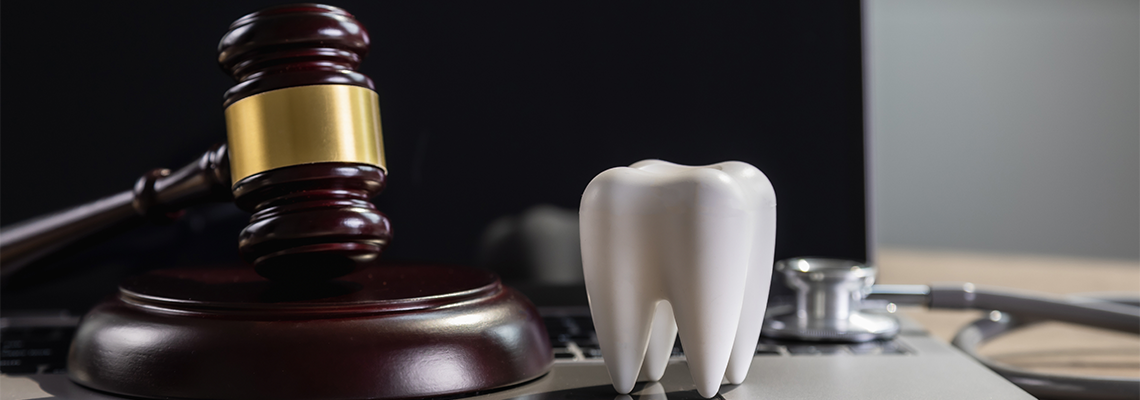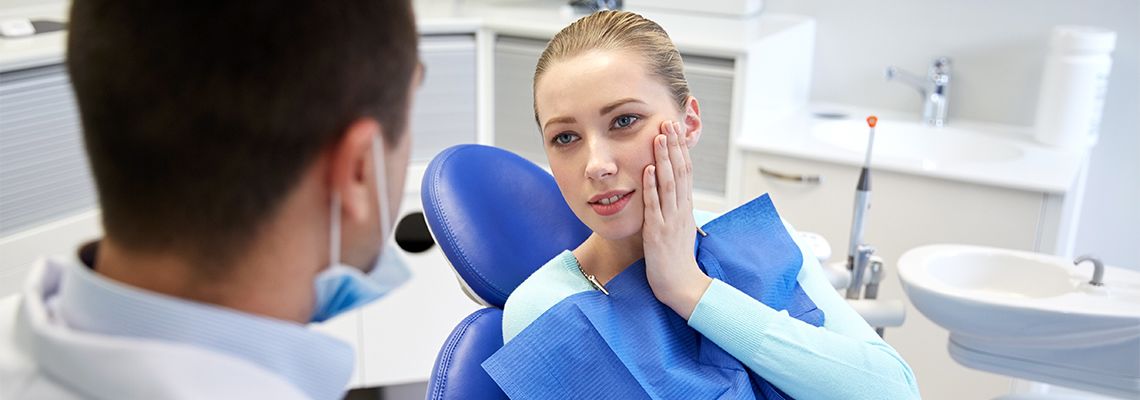Dental malpractice can cause significant harm, whether it's due to a misdiagnosis, improper treatment, or negligence during a procedure. If you’ve experienced this in Maryland or Washington, D.C., understanding how to report dental malpractice and the steps involved can protect your rights.
To The Highest Standards
Schedule a Free Consultation Today

Can You Sue a Dentist for Nerve Damage?
The straightforward answer is, yes, you can sue a dentist for nerve damage. Nerve damage is a serious and sometimes irreversible injury that can result from many different dental procedures.
At the Law Offices of Fred B. Goldberg, PC, our legal team will explore the possibility of suing your dentist for nerve damage, the types of nerve damage that can occur, and how to prove negligence. Together, we can help you seek the compensation you deserve.
We proudly help clients build a strong case throughout Baltimore, Columbia, Washington D.C., Rockville, Frederick, Annapolis, Towson, Hagerstown, Berkeley Springs, Cumberland, Salisbury, and Ocean City, Maryland.
Understanding Dental Nerve Damage
Nerve damage during a dental procedure can occur for various reasons and can affect different nerves in the facial region. The most commonly affected nerves include:
Inferior alveolar nerve (IAN): This nerve is often affected during procedures such as wisdom tooth extractions, root canals, or dental implants. Damage to the IAN can result in numbness or altered sensation in the lower lip, chin, and sometimes the lower teeth. In rare cases, it can lead to chronic pain known as neuropathic pain.
Lingual nerve: This nerve can be damaged during wisdom tooth extractions or injections for anesthesia, particularly in the mandibular region. Damage to the lingual nerve can cause numbness, tingling, or a burning sensation in the tongue, as well as loss of taste on the affected side of the tongue. In some cases, patients may experience difficulties with speech and eating.
Mental nerve: This nerve may suffer damage during implant placement, oral surgeries, or even from trauma. Damage to the mental nerve can lead to numbness or altered sensation in the lower lip and chin area. This can significantly impact the patient's quality of life, affecting their ability to feel their lip and chin area normally.
Symptoms of nerve damage can vary in severity and may include:
Numbness: A loss of sensation in the affected area, which can be temporary or permanent.
Tingling: A sensation often described as "pins and needles" or a mild prickling feeling.
Burning sensations: A feeling of warmth or burning, which can be uncomfortable and persistent.
Loss of taste: Particularly relevant when the lingual nerve is affected, leading to a diminished or altered sense of taste on one side of the tongue.
Pain: This can range from mild discomfort to severe, persistent pain. In some cases, nerve damage can lead to chronic neuropathic pain, which may require specialized treatment.
Preventing nerve damage involves careful planning and precision during dental procedures. Dentists and oral surgeons use various techniques and tools to minimize the risk, such as detailed imaging, knowledge of anatomical variations, and employing minimally invasive methods when possible.
In cases where nerve damage occurs, early diagnosis and intervention are crucial for optimal recovery. Treatments may include medications, physical therapy, or, in some cases, surgical repair of the damaged nerve.
When Is a Dentist Liable for Nerve Damage?
To hold a dentist legally accountable for nerve damage, proving negligence is essential. Negligence means the dentist failed to provide the standard care that a reasonably competent dentist would have provided under similar circumstances. These specific aspects will be considered:
Breach of duty
Diagnosis of preexisting conditions: Did the dentist fail to diagnose a preexisting condition that could increase the risk of nerve damage? For instance, conditions such as impacted teeth or existing nerve-related issues should be identified and considered before proceeding with any dental work.
Technique and precautions: Was the procedure performed with improper technique or a lack of necessary precautions? This could include using inappropriate tools, applying excessive force, or failing to follow standard protocols for the specific procedure.
Training and competency: Did the dentist have the necessary training and qualifications to perform the procedure? In some cases, general dentists may attempt procedures that should be carried out by specialists, increasing the risk of complications.
Causation
Direct result: Can it be proven that the nerve damage directly resulted from the dentist's actions? This often requires expert testimony to establish a clear link between the dentist's conduct and the injury sustained.
Informed consent: Was the nerve damage a known risk of the procedure, and were you informed of this risk? The dentist should provide comprehensive information about potential complications, allowing you to make an informed decision. If they failed to do so, it could be considered a breach of duty.
Damages
Physical injuries: What specific physical injuries have you suffered as a result? This can include persistent numbness, tingling, or pain in the affected area, as well as potential loss of function in the muscles or tissues surrounding the nerve.
Emotional distress: How has the nerve damage impacted your mental and emotional well-being? Chronic pain and physical limitations can lead to anxiety, depression, or other emotional challenges.
Additional medical costs: Have you incurred additional medical expenses due to the nerve damage? This might involve costs for further treatments, medications, or corrective surgeries.
Loss of income: Has the injury affected your ability to work, leading to a loss of income? This is particularly relevant if the nerve damage has resulted in long-term or permanent disability.
Each of these elements must be carefully evaluated and substantiated with evidence to establish the dentist's liability for nerve damage.
Consulting with a legal professional who specializes in dental malpractice can provide further guidance and help navigate such cases.
Types of Procedures That Commonly Lead to Nerve Damage
Nerve damage is a serious and often painful complication that can arise from various dental procedures. Some procedures carry a higher risk of causing nerve damage than others. These include:
Wisdom tooth extractions: One of the most common dental procedures associated with nerve damage, particularly affecting the inferior alveolar nerve and the lingual nerve. During the extraction, these nerves can be stretched, compressed, or severed, leading to numbness, tingling, or even pain in the lower lip, chin, and tongue. Proper imaging and careful surgical planning are crucial to minimize these risks.
Dental implants: The placement of dental implants requires precise planning and execution. If an implant is positioned too close to a nerve, it can impinge on it, causing pain, numbness, or other sensory changes. The inferior alveolar nerve is particularly at risk. Advanced imaging techniques such as cone beam computed tomography (CBCT) can help in mapping out the exact location of nerves and ensuring safe implant placement.
Root canals: Although less common, root canals can lead to nerve damage if improperly performed. The procedure involves cleaning and sealing the root canals of a tooth, which lie in close proximity to various nerves. If the instruments used during the procedure penetrate too deeply, they can reach the nerves, causing lasting damage. Accurate measurement and careful technique are essential to avoid such complications.
Local anesthetic injections: The administration of local anesthesia is a routine part of many dental procedures, but incorrect injection techniques can result in nerve injuries. For instance, injecting the anesthetic too close to a nerve can cause direct trauma, leading to temporary or even permanent nerve damage. The inferior alveolar nerve and lingual nerve are particularly susceptible during such injections. Proper training and experience are vital to reduce the risk of nerve injury.
Understanding the potential risks and complications associated with these dental procedures can help both patients and practitioners take preventive measures to minimize the likelihood of nerve damage. Advanced imaging, careful planning, and precise execution are key strategies in safeguarding nerve health during dental treatments.
Legal Steps to Take
If you suspect that you have suffered nerve damage due to dental malpractice, here are some detailed steps to consider:
Document everything: Keep detailed records of your symptoms, medical visits, and any treatments you receive. Note down the dates, times, and descriptions of your experiences. Obtain copies of your dental records and any communications with your dentist. This includes x-rays, treatment plans, emails, and any other relevant documentation. Maintain a journal documenting your pain levels, daily impact, and any changes in your condition over time. This can serve as evidence of the ongoing impact of the injury.
Seek a second opinion: Consult another dental or medical professional to confirm the diagnosis and severity of the nerve damage. Make sure this professional is independent and has no affiliation with your original dentist. An expert can help establish that the injury was due to negligence. They can provide a detailed assessment and may offer a written report or testimony if needed.
Consult an attorney: Seek legal advice from an attorney who specializes in dental malpractice cases. Look for someone with a strong track record and experience in similar cases. Provide the attorney with all the documentation you’ve gathered, including your personal records, medical records, and second opinion reports.
By following these steps meticulously, you can build a strong case and increase your chances of receiving fair compensation for your injury.
Craft a Strong Case to Pursue Compensation
Nerve damage resulting from dental procedures can have long-lasting impacts on your quality of life. If you believe that your nerve damage was due to your dentist's negligence, you might have grounds for a lawsuit.
For more information or to discuss your case, contact our legal team at the Law Offices of Fred B. Goldberg, PC for a free consultation. We are here to help you through each step of this challenging process.
We provide legal assistance to clients throughout Baltimore, Columbia, Washington D.C., Rockville, Frederick, Annapolis, Towson, Hagerstown, Berkeley Springs, Cumberland, Salisbury, and Ocean City, Maryland.
RECENT POSTS
At The Law Offices of Fred B. Goldberg located in Columbia, Maryland, the firm understands the intricacies and challenges that come with pursuing a dental malpractice lawsuit. Dental malpractice cases can be difficult to manage, often involving intricate medical details and personalized legal guidance.




